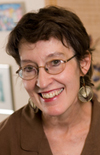For St. Thomas, the question of the day on Monday at President Julie Sullivan’s monthly brown bag luncheon was: “What do we need for St. Thomas to be excellent?”
In the interest of full disclosure, this is Corrine Carvalho’s question. Dr. Carvalho asked it at the Faculty Senate meeting last month during the discussion of a vision for the university, preparatory to strategic planning. At the time, I thought to myself, “Corri is already excellent; she doesn’t need anything else.” Then I started thinking about it more. Individual excellence isn’t all that we need to be excellent as a whole. The whole and the sum of the parts are two different things in this case.

Dr. Susan Alexander
It’s a really good question.
Dr. Sullivan asked the question, again preparatory to strategic planning, at Monday’s brown bag, and then she waited for an answer. She said straight off, “I’m a teacher; I can wait forever.” Well, I’m a teacher, too. Believe me, it feels like forever when you are waiting for the first brave soul in the class to raise that tentative hand. When the question is something like, “How would a federal government default affect the United States and the world’s macro economy?” forever can stretch into never.
But clearly Dr. Sullivan’s questions are not like that. She had to wait only a matter of seconds before the answers started and kept coming.
Most answers were student-centered. For example, Vice President for Student Affairs Jane Canney said that every student needs to graduate with an excellent experience, in and out of the classroom. Citing the Student Affairs mindfulness initiative, Writing across the Curriculum and paired courses, Professor Erika Scheurer observed that many excellent experiences occur in interdisciplinary efforts.
Answers often focused on specific areas – partnerships with alumni, employment opportunities, affordability, a fine arts building, high standards, and intercultural experiences for students, faculty and staff.
A bold member of the School of Engineering, John Fechter, reminded the group of the need for measurement. Without metrics, he said, we can’t tell if goals are being met. (Really, shouldn’t we all take a stats course?)
Then there was our big picture. We put it in different ways.
In a statement longer than his average homily, Father John Malone recalled a renowned linguist whose goal as a teacher was not to give all the information necessary to win the $60,000 question, but instead to teach students how to read a book; to teach for the future. The goal is not to be a social work agency, but to teach the importance of civic commitment; to serve and give, not just to desire.
Laurie Dimond said, “Students need to learn how to learn.” James Heaney put in a good word for the facts: learn something while you are learning to learn.
I found myself thinking of the Archbishop John Ireland quote that Dr. Sullivan used in her inauguration. Our founder’s wish was for the present to be better than the past and for the future to be better than the present. In all our different ways, this seems to be our common goal for our students.
Dr. Sullivan asked if we are optimistic – another good question. The answer is yes.






